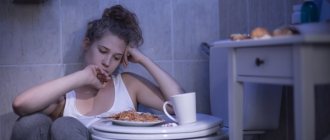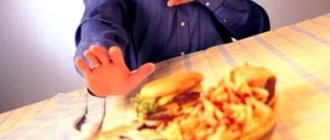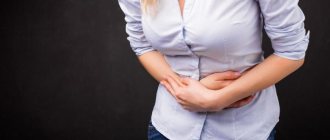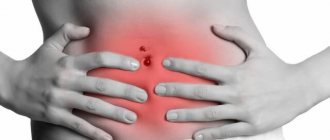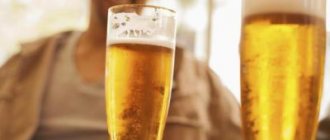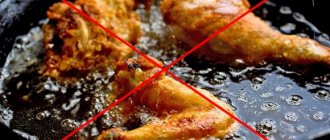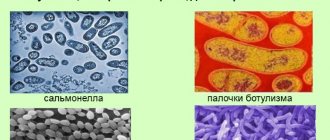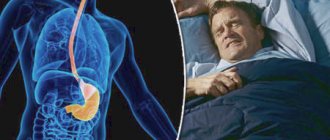Types of fats and their effect on digestion
Fats are complex chemical structures that are found in animal products. These substances are an important source of energy required by the human body. However, they contain a lot of calories. Therefore, the amount of fat should be limited. The type of these substances is also important.
Nutritionists distinguish two types of fats:
- healthy – unsaturated;
- harmful - saturated.
Healthy fats have unique effects on the body. Polyunsaturated elements include omega-3 and omega-6. There are also monounsaturated substances. They are called omega-9. These include unrefined vegetable oils. They are also found in raw lard, fish, nuts, eggs, and ghee.
Healthy fats are important for the human body because they help improve appearance, stimulate brain function and improve health. Thanks to eating food with such elements, it is possible to achieve a number of positive effects:
- stimulate metabolism;
- improve insulin synthesis;
- increase hormone production;
- provide the body with vital energy.
We can conclude that healthy fats have a positive effect on the process of food digestion. They do not have a harmful effect on the figure and do not cause bowel problems.
Harmful fats include saturated elements, cholesterol, and trans fats. Excessive consumption of foods with such substances provokes disturbances in the functioning of the digestive system, weight gain, the development of diabetes mellitus, and pathologies of the heart and blood vessels.
Through what foods do we get the lion's share of harmful fats? This is everyone's favorite and well-known refined sunflower oil. It is a source of trans fats and leads to vascular diseases, heart disease, hormonal imbalances and oncology.
Diarrhea after fat: additional symptoms
The most characteristic sign of fatty diarrhea is light color, very unpleasant odor, and oily consistency of stool, requiring thorough rinsing with water in the toilet. The most characteristic sign of
fatty diarrhea is light color, very unpleasant odor, and oily consistency of stool, requiring thorough rinsing with water. in the toilet. In addition, the person complains of constant pain and cramps in the abdomen, bloating, and partial loss of body weight.
You should also not underestimate other symptoms, such as:
- in nausea and even vomiting, which indicates clinical pathology of the pancreas;
- in jaundice, yellowing of the eyes, itchy skin, amber colored urine - a sign of liver and bile duct disease;
- in discolored white stool - a characteristic sign of cholestatic liver disease;
- in blood discharge caused by enteritis or celiac disease.
If you detect only these symptomatic disorders that occur with diarrhea after fatty foods, you should immediately consult a doctor.
The mechanism of development of diarrhea due to fatty foods
Many people experience bowel problems after consuming fatty foods. If a person does not make adjustments to their diet, there is a risk of chronic diarrhea. In this situation, diarrhea is constantly present and provokes vitamin deficiency, exhaustion and other unpleasant consequences.
The main causes of diarrhea from fatty foods include the following:
- Insufficiency of exocrine pancreatic activity. Normally, the organ is responsible for the synthesis of enzymes that break down food. With a deficiency of these substances, there is a risk of impaired absorption of fats and carbohydrates. As a result, the level of undigested elements in the lumen of the digestive tract increases, and the amount of water also increases. Such factors provoke the appearance of diarrhea.
- Lack of bile acids. This condition is associated with all sorts of disorders - pathologies of the liver, small intestine, and gall bladder. As a result, a person is faced with a violation of the absorption of fats that enter the body with food, and fluid retention in the digestive tract. As a result, the risk of diarrhea increases significantly.
- Allergy. In this situation, there is no direct relationship between fat consumption and the occurrence of an intolerance reaction. The cause of problems with stool is high sensitivity to the protein components that are present in a particular product.
Fatty diarrhea: treatment depends on the cause
Treatment can only be carried out after diagnosis, but of course it will vary depending on the disease. For example, when treating poor absorption due to damage to the pancreas, pancreatic enzyme therapy is performed, which the patient lacks. If fatty diarrhea is caused by celiac disease, then it is effective to prescribe a gluten-free diet, that is, a diet that excludes gluten.
Patients are strictly prohibited from consuming wheat, rye, or barley in any form.
When it comes to the proliferation of bacterial flora, then naturally the most effective way is antibacterial therapy. The greatest risk for patients with chronic fatty diarrhea is dehydration and electrolyte imbalance in the body. Therefore, appropriate hydration is prescribed to ensure sufficient water content in the human body. The total water content in the body should be at the level of 60% by weight. Take care of yourself and always be healthy!
Features of the clinical picture
If diarrhea occurs after fatty foods, there are different reasons. To make a correct diagnosis, additional manifestations need to be analyzed. If diarrhea persists for several days, you should consult a doctor.
Each pathology is characterized by specific symptoms:
- Pancreatitis. In this case, in addition to diarrhea, nausea, vomiting and flatulence are observed. Feces have a gray tint.
- Allergy. This disease is accompanied by discomfort in the stomach, rashes, and itching.
- Liver pathologies. This disorder is characterized by a yellow complexion and nausea. Many people experience general weakness.
- Infectious pathologies. When they develop, purulent or bloody impurities are present in the stool, the person loses appetite, experiences nausea and vomiting. As infections develop, there is a risk of increased body temperature and general weakness.
- Irritable bowel syndrome. This disease is accompanied by mucous impurities in the stool, flatulence, and a feeling of incomplete evacuation during bowel movements.
What diseases may this indicate?
Diarrhea in adults and children is often associated with diseases of the gastrointestinal tract, liver, and gall bladder. The doctor will help determine the provoking factor after diagnosis.
Allergy
If you have an allergic reaction to a certain type of food, it is necessary to identify the allergen and eliminate it from the diet. Eating fatty foods provokes diarrhea due to individual intolerance to the components.
Perhaps the patient consumed a new dish along with junk food, which caused diarrhea. This can be found out by excluding previously unused products from the menu. Modern diagnostic methods and tests will help, the purpose of which is to identify the component that causes the allergy.
Symptoms of diarrhea due to allergies:
- Skin rashes.
- Scabies.
- Pain in the stomach.
Unpleasant symptoms can be caused by products:
- mayonnaise,
- ketchup,
- fish,
- milk,
- meat,
- eggs,
- alcoholic drinks.
Sometimes an allergic reaction is unpredictable, and a negative reaction to a particular component occurs after a long period of time.
Gastrointestinal diseases
Irritable bowel syndrome can be caused by stress, depression and poor diet. A complication arises - steatorrhea, a disease characterized by an excess of fat in the stool.
Symptoms of the disease:
- Swelling.
- Constant thirst.
- Protein deficiency.
- Convulsive states.
- Weight loss.
- Insomnia.
Diarrhea that accompanies the disease can be eliminated with the help of a diet prescribed by a doctor.
Diarrhea occurs with a stomach ulcer, which is characterized by the following symptoms:
- pain in the upper region of the stomach,
- prostration,
- diarrhea,
- nausea.
Signs appear more pronounced after eating fried, fatty foods. A few hours after eliminating loose stools, the pain goes away.
Disturbance of the intestinal microflora, which occurs due to insufficient activity of beneficial bacteria, leads to dysbacteriosis, which is accompanied by:
- Alternating diarrhea and constipation.
- Bloating.
- Flatulence.
- Belching.
- Rumbling in the intestines.
Most children with diagnosed dysbiosis are allergic to certain foods.
A disease of the pancreas accompanied by degenerative processes is called pancreatitis. The reason for its occurrence may be uncontrolled consumption of fried, fatty, salty foods.
There are 2 forms of the disease:
- Acute: aggressive enzymes are delayed and do not enter the duodenum. Against this background, its dysfunction and disturbances in the functioning of the pancreas arise.
- Chronic: occurs when there is constant diarrhea and the patient ignores the problem condition. As a result, Fe cells are replaced by connective or fatty tissue.
During the development of these forms, the body does not completely digest the food, but it passes further through the gastrointestinal tract. As a result, the intestines become irritated, increasing muscle peristalsis, and feces come out earlier than they should. The situation provokes diarrhea.
Symptoms of the disease:
- Increased flatulence.
- Bloating.
- Belching.
Fermentation of fecal debris begins and gases are formed.
Liver disease
Vomiting and loose stools occur with liver failure, in the later stages of the disease, after eating spicy and salty foods. Treatment of the disease is aimed at eliminating the causes that caused it. The problem often occurs against the background of hepatitis, acute poisoning, liver cirrhosis, and after the use of antibiotics.
Negative consequences:
- enzyme formation decreases,
- the body does not receive enough bile acid,
- food is not digested.
As a result, diarrhea occurs. Treatment requires adherence to a diet; alcohol, fatty, and salty foods are eliminated from the menu. It is important to observe the rules of personal hygiene.
Gallbladder
Enzymes are inactive during production. If the bile ducts are working at half capacity, diarrhea begins due to indigestion of food.
Symptoms of the acute form of the pathology:
- The act of defecation occurs more than 10-12 times in 24 hours.
- Heartburn occurs.
- There is a bitterness in the mouth.
In rare situations, constipation occurs.
What information is missing from the article?
- What frequency of bowel movements is considered normal and what is considered a disease?
- More recipes to stop diarrhea at home
- Description of cases for contacting a doctor
- Review of drugs
- Is the disease serious?
Diagnostic methods
If diarrhea from fatty foods occurs regularly, a diagnostic test should be performed. Neglecting this violation is strictly prohibited. Chronic diarrhea provokes the leaching of beneficial substances from the body. If you do not help a person in time, there is a risk of exhaustion, loss of potassium and magnesium. This can lead to seizures, blood poisoning, and even coma.
Taking into account the clinical picture of the pathology, the patient undergoes the following diagnostic procedures:
- examination of feces - thanks to this analysis, it is possible to identify helminthic infestation, bloody impurities or dysbacteriosis;
- colonoscopy;
- biochemical blood test;
- ultrasound examination of the abdominal cavity;
- irrigoscopy.
Only after a comprehensive examination will the doctor be able to determine the causes of diarrhea. Thanks to this, it is possible to select effective medicines
Diarrhea from fatty foods is more common in whom?
This symptomatic condition is based on digestive disorders caused by exocrine pancreatic insufficiency and malabsorption, that is, insufficient absorption of nutrients in the small intestine.
As a rule, diarrhea after eating fatty foods occurs in older and/or elderly people, as a result of a violation of the intestinal microflora or due to chronic malaise of the digestive system - cystic fibrosis of the intestine or cholestatic liver disease, cholestasis. Among other reasons, diarrhea after fatty foods can be caused by the absence of part of the pancreas or due to the removal of part of the intestinal tract
Treatment
If signs of diarrhea occur, you need to drink a lot and stick to your diet. The use of medications is permitted only as prescribed by a gastroenterologist.
Medications
The choice of remedy depends on the cause of diarrhea. Most often, medications are prescribed to treat the underlying pathology. The following categories of drugs are usually used:
- Myotropic antispasmodics. The most effective include no-shpa and drotaverine.
- Non-steroidal anti-inflammatory substances. Doctors usually prescribe ketoprofen or paracetamol.
- Antisecretory agents. This category includes Pantoprazole and Omez.
- Enzyme preparations. These include pancreatin and mezim.
- Antiemetics. An effective representative of this group is Domrid.
- Choletolytic drugs. These include Ursodeoxycholic acid.
- B vitamins.
- Intestinal motility inhibitors. This category includes Imodium and Loperamide. They help suppress diarrhea.
Medicines that inhibit intestinal motility should not be used until an accurate diagnosis has been made. They are strictly contraindicated when bloody impurities appear in the stool.
Traditional methods
To cope with diarrhea, you can use effective folk recipes. However, such products should be used only after consulting a doctor. In some cases, they can only worsen your health.
The most effective recipes include the following:
- St. John's wort. Take 20 g of dry herb, add 500 ml of boiling water and leave for half an hour. Strain and take 100 ml orally. This needs to be done 4 times a day.
- Sagebrush. To make an infusion, you need to mix 1 large spoon of herb with 1 cup of boiling water. Leave for 20 minutes. Take the finished product orally. It is recommended to divide the resulting amount by 4 times.
- Blueberry. To get a healing drink, you need to take 2 large spoons of dried fruits and add 250 ml of boiling water. Leave to infuse for 10 minutes. Take 1 tablespoon of the finished product. This must be done every hour.
- Chamomile. To prepare the product you will need 20 small spoons of dried chamomile flowers. They need to be poured with 1 liter of boiling water and left for 5 hours. Take 200 ml three times a day.
Since diarrhea causes serious fluid loss, it is imperative to replenish the deficiency. To avoid dehydration, you need to drink saline solutions. At home, it is enough to take 7 small spoons of sugar per 1 liter of water and add 1 teaspoon each of soda and salt. The finished composition should be drunk in an amount of 1–2 liters per day.
Causes and treatment of diarrhea after eating fatty foods
Every person has experienced diarrhea at least once in their life. But for some, the phenomenon develops after eating certain foods or a certain type of food. Typically, intestinal upset in this case is mild. But is it really harmless? Why does diarrhea appear after fatty foods? What are the reasons? How to provide effective assistance?
Diet to restore the body
To cope with diarrhea, you should definitely follow a diet. Doctors advise following these rules:
- If diarrhea occurs, you should immediately stop eating solid foods. Such food leads to damage to the walls of internal organs. Therefore, you should give preference to soft and pureed foods. Ready-made dishes can be ground in a blender.
- Reduce the load on the digestive organs. To do this, you need to eat often, but in small portions. You should not allow yourself to feel a strong feeling of hunger. The intervals between meals should not exceed 3–4 hours.
- Avoid foods that can cause flatulence. With bloating, the intestinal walls are irritated, which worsens the problem. It is also not recommended to consume foods that have a choleretic effect on the body.
- Control the supply of sufficient energy to the body. People who are used to leading a not too active lifestyle require about 2000 kcal per day.
- Eliminate bad habits. This is important for the full recovery of the body. Smoking and drinking alcohol provoke irritation of the gastric mucosa.
- Avoid fried foods. And food cooked over an open fire is also prohibited.
- Avoid fatty foods, smoked meats, marinades, and pickles. Canned food should be added to the prohibited list.
Basic diet
Although everyone's tastes are different, preference should be given to natural, healthy products:
- porridge from whole grain cereals (oats, pearl barley, buckwheat, brown rice);
- unrefined virgin vegetable oil (sunflower, flaxseed, corn, olive);
- raw lard;
- lean meat - it should be consumed in the form of steam cutlets;
- lean fish – preferably boiled or steamed;
- fruits - you can eat bananas, persimmons, apples;
- fermented milk products – contain beneficial bacteria, so they can be consumed in any volume;
- vegetables - it is advisable to eat them boiled, giving preference to carrots, beets, and zucchini;
- stale bread – it’s best to stick with breadcrumbs.
Be sure to drink at least 2 liters of water. Thanks to this, it will be possible to speed up the process of restoration of the digestive organs. It is worth considering that on the first day of diarrhea it is recommended to completely stop eating.
The answer to the question whether diarrhea can occur from fatty foods is yes. This disorder is associated with various pathologies and can provoke exhaustion of the body. To avoid negative health consequences, it is important to promptly contact a gastroenterologist, who will be able to make the correct diagnosis and select adequate therapy.
Practical advice
With functional diarrhea, folk remedies alone will not help. It is important to completely change your eating habits and try to adhere to the following recommendations:
- eat often, but little by little, without skipping meals;
- refuse hot and cold dishes - foods should be warm, semi-liquid consistency;
- You should give preference to steamed products;
- you should give up alcohol and fatty foods at least for the duration of treatment;
- it is important to minimize the consumption of things that cause fermentation;
- drink a lot of water - at least 1.5–2 liters per day;
- Once every 2 weeks, arrange a fasting day in the form of hunger.
Do not think that any folk remedies are effective and harmless. Some of them may cause allergies or may not be suitable if certain pathologies are present. Before using a previously unknown traditional treatment method, you should consult your doctor.
Prevention of pancreatic diarrhea
Pancreatitis is a serious disease that, if not treated in a timely manner, leads to various complications with disastrous consequences. Proper nutrition, avoidance of alcohol, taking medications as prescribed by the doctor, and a healthy lifestyle will help prevent the development of inflammation of the pancreas and pancreatic diarrhea.
If you detect the first signs of a disturbance in the functioning of the digestive system, you should not wait for the appearance of a dangerous symptom of diarrhea. It is necessary to immediately consult a doctor for an accurate diagnosis and subsequent prescription of effective treatment. The doctor’s recommendations must be strictly followed, this applies to the prescribed diet, regimen, and medication. Following simple and obvious rules will allow you to quickly restore your health and avoid serious consequences.
Traditional and medicinal methods of treating functional diarrhea
It is better not to interfere with the cleansing of the body at the first disorder.
What to do if an unpleasant condition takes you by surprise, and the problem has to be solved immediately? There are a number of folk remedies that will help eliminate symptoms of diarrhea and have a beneficial effect on intestinal health:
- A decoction of oak bark can be used for treatment. It is brewed with boiling water; you can take a glass of the decoction immediately after eating. You can use it twice a day, for example, morning and evening. Usually, a few doses are enough to cope with intestinal dysfunction.
- A simple recipe against diarrhea: regular buckwheat porridge without salt. You need to eat a few spoons of porridge on an empty stomach, and there will be no further problems with diarrhea.
- The following remedy can be used against diarrhea in children: you need to grind one nutmeg, then the resulting powder is dissolved in a glass of milk. The mixture should be given one teaspoon at a time and should be taken every 4 hours.
- Strong tea, acorn decoction and some other folk remedies also have strengthening properties. Among them is an extreme recipe: a teaspoon of salt is dissolved in 100 g of vodka. The product should be taken immediately after meals.
If possible, you should first consult a doctor: diarrhea is one of the body’s defense reactions, and with its help the intestines are cleansed of toxic substances. If this process is interfered with, serious intoxication is possible: diarrhea may be caused by infection or poisoning.
If an intestinal disorder occurs for the first time, it is recommended not to interfere with the cleansing process by providing the patient with warm, generous fluids to prevent dehydration. Taking activated carbon will help, in addition, therapeutic fasting is necessary.
Since the food is not properly digested anyway, eating it repeatedly is like throwing coal into a firebox. Fasting with plenty of fluids is recommended for about 24 hours. If diarrhea is constantly observed at approximately the same time, the patient is not bothered by night urges, but they occur immediately after meals, most likely we are talking about a neurological disorder, and it is advisable to eliminate its cause as quickly as possible.
During periods of stress, the doctor may prescribe sedatives, and in case of prolonged neuroses and severe stress, antidepressants. Diarrhea in this case is only one of the manifestations of the disease, and complex treatment of the nervous system will be required.
You will learn how to treat diarrhea from the video:
In the 21st century it is difficult to find a 100% healthy person. Bad habits, unhealthy diet, stress, poor environment - all of the above causes pathologies of various organs, and the digestive tract - in most cases. The action of the mentioned factors often leads to the development of inflammatory processes in the tissues of the pancreas and triggers the development of forms of pancreatitis. The disease manifests itself with severe girdling pain, nausea and other unpleasant symptoms, which include diarrhea.
